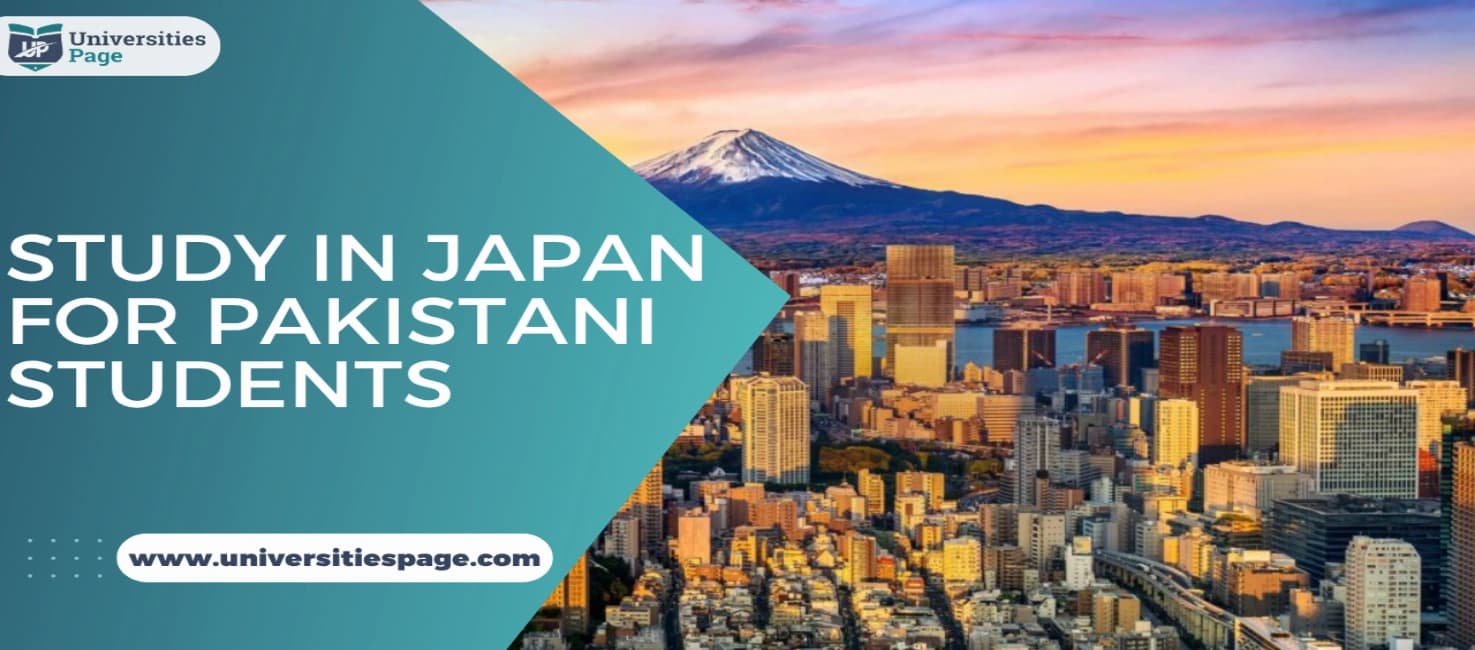Loading article...
Preparing your reading experience
Loading article...
Preparing your reading experience

Studying in
Japan is the best option for Pakistani students as it provides
international students with immense opportunities to study and continue their
research work. The official language of Japan is Japanese. Japan
is a country where very old traditions compare with new technology, making its
culture unique. Japan has many universities, some of which take pride in their
research history and ranking. According to a recent analysis, it has
approximately 810 universities, categorized as 622 private,
102 public, and 86 national.
The tuition fee is reasonable in Japan. On average, the Tuition fees in Japan range from ¥500,000 to ¥1,000,000 per year for undergraduates and ¥500,000 to ¥1,500,000 per year for graduates. IELTS is optional for applying to various universities. The Eligibility Criteria is that those studying in Japan must have relevant transcripts and a health certificate, and students must be 18 years old or above. There is no upper age limit in Japan. A bank statement of at least 1,500,000 JPY or its equivalent in current currency is required, and students must renew their visas every year. The Visa ratio for Japan is 95%.
|
Study in Japan for Pakistani Students 2024-25 |
|
|
Teaching Language |
Japanese and English |
|
Country |
Japan |
|
Top Scholarships in Japan |
|
|
Scholarship duration |
Undergraduate: 4 years Masters: 2 years Doctoral Program: 3-5 years |
|
Scholarship Type |
Can be either fully or partially funded |
|
Eligibility Criteria |
Transcripts, excellent academic record, age
limits may apply, relevant academic and professional background, research
proposal in case of PhD |
|
IELTS Requirements |
Minimum 6.0 (required in English programs only) |
|
CGPA Requirements |
Undergraduate: around 2.5 to 3.0 Masters: 3.0 Doctoral Program: 3.0 |
|
Part-time Jobs |
Allowed (28 hours per week) |
|
Average monthly expense |
Around ¥100,000 to ¥150,000 (approximately $700
to $1,000) |
|
Scholarship Processing Time |
2 to 6 months from the application deadline |
|
Entry Test |
Undergraduate: may require entrance tests Master's/Doctoral: depending on the program and
field, often requires standardized exams or interviews |
There are various scholarships available in Japan for
international students:
The Ministry of Education and Technology MEXT of the
Government of Japan has welcomed global students to come to Japan to study at
national expense. Japanese embassies or Japanese universities select the
students.
JASSO accepts students accepted by Japanese schools based on
student exchange agreements or other student exchange agreements with their
home schools outside Japan and provides a "Student Exchange Support
Program Scholarship for Study agreement in Japan under the Agreement. "
A local international association in Japan provides scholarships to pupils in its district. The scholarships are categorized according to the foundations' locations.
Private companies finance private foundation scholarships.
They can be awarded to students attending schools in a particular district,
limited to special subjects related to the company, or offered to students from
a particular country or area with which the undertaking has exchanged,
reflecting the purpose and nature of the company or organization.
These universities specifically provide scholarships and
grants to students:
|
World ranking |
32 |
|
Acceptance rate |
34.2% |
|
IELTS required or not |
7.0 |
|
Average tuition fee |
535,800 JPY |
The University of Tokyo is famous for its high academic standards, providing education at the international level and emphasizing research and critical thinking. Its international students come from a very diversified environment, and many programs are taught in English. The university fosters global connections through various international exchange programs and collaborations. Moreover, the University of Tokyo offers scholarships and multiple financial aid for international students.
|
World ranking |
50 |
|
Acceptance rate |
11% |
|
IELTS required or not |
6.0 |
|
Average tuition fee |
International tuition 535,800 JPY |
Kyoto University is one of Japan's leading universities, boasting high academic quality and innovative research. It offers international students an enabling and multicultural environment where many programs are taught in English to assist them throughout their studies. The university also offers numerous scholarships and financial aid to international students to make its high-quality education more accessible and to ease financial burdens.
|
World ranking |
78 |
|
Acceptance rate |
13% |
|
IELTS required or not |
6.0 |
|
Average tuition fee |
538,00 YUAN |
What makes Osaka University unique is its emphasis on innovative and entrepreneurial skills development in addition to conventional academic learning. With many interdisciplinary programs available, international students can develop collaborative projects and research activities with local and international partners. Also, Osaka University has active international student communities and cultural exchange programs that make the experience even more worthwhile through cross-cultural understanding and personal development. Additionally, the availability of scholarships and financial support to international students indicates the university's interest in global talent and the worth of their educational journey.
|
World ranking |
84 |
|
Acceptance rate |
10% |
|
IELTS required or not |
6.5 |
|
Average tuition fee |
535,800 JPY |
Tokyo Institute of Technology, commonly known as Tokyo Tech, boasts of using the latest education techniques. Tokyo Tech offers a variety of scholarships for international students to support their studies with merit-based awards and financial aid.
|
World ranking |
311 |
|
Acceptance rate |
41% |
|
IELTS required or not |
7.0 |
|
Average tuition fee |
535,800 JPY |
Tohoku University in Sendai, Japan, is one of the leading institutions boasting excellent academics and innovative research. International students also get various other benefits from Tohoku University, which enhances outstanding research facilities, expanded academic programs, and the community needed for support. Scholarships targeted at international students also relieve financial pressures.
To study in Japan, although there are different requirements
for every university and department. Yet, here are some common requirements
that every university usually asks; however the specific requirements and
additional documents vary from every university
Generally, these are the departments offered by the Japanese
universities to the students:
The living costs in Japan for an international student for a
month are quite affordable. The rents in Tokyo and other big cities are higher
than in rural areas. The national average for housing is 38,000 yen per month,
while Tokyo is at 50,000 yen. It is also hard to rent apartments or other
accommodations in metropolitan areas near schools, raising commuting costs.
Students can work a maximum of 28 hours per week during the
school term. Part-time work is allowed during international studentship in
Japan, but some restrictions exist. I've included the overview below.
While international students in Japan can start working after their studies, they need to apply for a "Designated Activities" visa to seek employment related to their field of study. After finding employment, one can apply through a "General" or "Specialist in Humanities/International Services" work visa application. This means finding employment and applying for a visa by the description of work. Supportive policies, such as job fairs and career counseling in Japan, ease the graduates' job-seeking burden and extend their stay.


Mahnoor is a seasoned visa consultancy professional with over 11 years of hands on experience guiding Pakistani students toward successful study abroad journeys. Her expertise spans international education systems, student visa regulations, and global immigration frameworks, making her a trusted voice in the study abroad industry. Over the past 11 years, Mahnoor has worked closely with students, parents, educational institutions, and international partners to simplify complex visa processes and ensure compliance with ever changing immigration laws. Her deep understanding of country-specific visa requirements enables him to provide accurate, up to date,...
Read moreDiscover more insightful articles about global education and study abroad opportunities

Planning to study abroad can be an exciting yet challenging journey, and selecting the best study visa consultants in Lahore is a crucial step to ensure your study visa application process is handled smoothly and successfully. A professional study visa consultant not only assists students applying for visas to destinations like the UK, USA, Canada, Australia, and Europe but also provides expert guidance on visa requirements, documentation, and application procedures, ensuring compliance with embassy requirements, meeting deadlines, and navigating the complex process with careful attention.
_1771671075407.webp&w=3840&q=75)
Discover if taking a gap year affects your study abroad plans. Find answers to common questions for smooth international admissions.
_1771671096771.webp&w=3840&q=75)
Get answers to common questions on studying abroad with low grades and explore options to achieve your international education goals.
Engage with our community of students and education experts. Your insights matter!
Share your thoughts with the community
No approved comments yet. Share your thoughts!